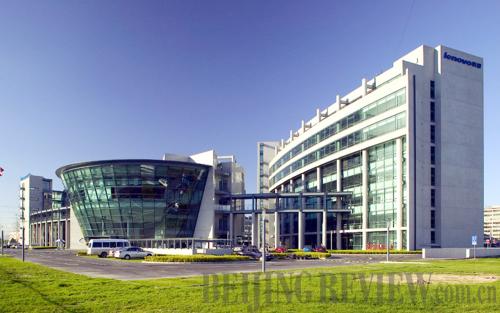|
 |
|
PRIVATE GIANT: PC Maker Lenovo is one of many transnational Chinese companies competing globally (XINHUA) |
Nuclear power, oil exploration and exploitation, railways, telecommunications and other sectors that used to be monopolized by state-owned capital may be new arenas for private capital. Opinions on Encouraging and Guiding Sound Development of Private Investment, issued by the State Council on May 13, opened a new range of government-run industries to the private sector.
The government will encourage and guide private capital to enter such sectors as basic industries and infrastructure, public utilities and affordable housing construction, welfare, financial services and national defense, said the document. Government investment will mainly be used in economic and social sectors that are related to national security and where resources cannot be effectively allocated by the market.
Obstacles
Private capital emerged just after China carried out the reform and opening-up policy in 1978 and has developed rapidly in the last 10 or so years. Figures from the National Development and Reform Commission (NDRC) show that private capital has become an important force boosting national economic development, the mainstay of the country's fiscal revenue and a major channel of creating job opportunities. Some private transnational companies such as Huawei, ZTE, Lenovo and Wanxiang have acquired independent intellectual property rights and developed independent brands. Many private companies have demonstrated their vision and capability of handling transnational operations and global resource allocation, and are able to compete internationally.
NDRC figures show that among China's top 500 businesses, the number of private companies and their sales revenues accounted for 20.8 percent and 9.2 percent of the total, respectively, in 2009, compared to 13.8 percent and 5.6 percent in 2003.
However, the industrial distribution of private capital is not balanced. In 2005, the State Council issued a document encouraging and guiding the development of the non-public economy, outlining the sectors that allow private enterprises to enter. But the document's lack of detail hindered implementation. For example, according to the document, private capital should be allowed to enter industries where foreign capital is permitted. Among the more than 80 industries, however, while 62 allowed access by foreign capital, only 41 granted access to private capital.
NDRC statistics also indicate that the current proportion of private investment in traditionally monopolized sectors is relatively low. In the power production and supply industry, private investment accounts for 13.6 percent; in education, 12.3 percent; in health care, social security and welfare sectors, 11.8 percent; in finance, 9.6 percent; in postal services, 7.5 percent; and in water conservancy, environment protection and public utility sectors, 6.6 percent. In petroleum, telecommunication and railway sectors, the proportion of private investment is negligible at best.
In 2009, the NDRC carried out a special investigation on the difficulties and obstacles for the development of private investment. The commission found out that private investment faced four problems. First, industrial access, especially in some traditionally monopoly industries, is a major obstacle. Second, the financing difficulties have not been thoroughly solved, and banks are granting more credit to big projects or large companies, making it more difficult for small and medium-sized enterprises to finance their endeavors. Third, the capability of private investment should be further improved, transformation of investment by private companies should be accelerated, and the management level of private investment needs to be increased. Fourth, special consideration needs to be given to improving the policy environment for private investment and strengthening the service system.
Li Pumin, Director of the NDRC Department of Policy Studies, said the new document aims to solve these problems.
A crucial year
The document is part of the Central Government's efforts to enrich the stimulus package to deal with the global financial crisis. "It will help further stimulate the internal impetus and vitality for economic development and consolidate the momentum of economic growth," said the NDRC.
In 2009, facing the impact of the global financial crisis, China promptly launched a stimulus package to promote economic development and continuously improved it, allowing the Chinese economy to recover first throughout the world. During this process, government investment has played an irreplaceable role in maintaining social confidence, driving up investment and stabilizing the economy. However, in the market-oriented reform and development, relying on stimulus policies alone, such as government investment and credit growth, is far from enough to drive the economy.
The NDRC statement noted 2010 is a crucial year to consolidate economic momentum, and it will also be one that faces extremely complicated economic situations. While maintaining government investment on a certain scale, the government should pay more attention to adopting effective measures to stimulate private investment, transfer private savings into internal impetus for investment increase.
|
